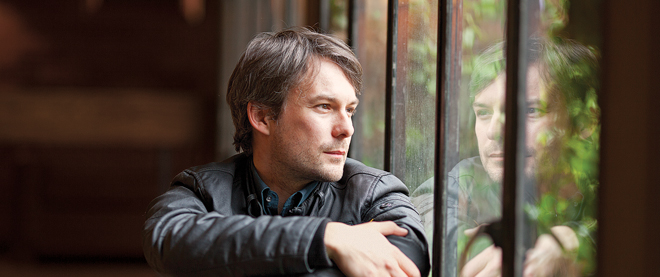Author Peter Hobbs’ creative life—despite virus and parasites
‘Illness is a foreign land where you always go alone’
Share

In 1996, Englishman Peter Hobbs was on course for a dramatic new life—though not the one he’d foreseen. Just 23 years old, he’d finished a master’s in international relations and had been recruited out of Oxford by the British Foreign Office. He deferred the start of his job to travel to Pakistan for a few months. But in Pakistan, Hobbs contracted a virus and parasites that would befuddle London doctors and incapacitate him for 10 years. He was diagnosed with post-viral fatigue and then chronic fatigue syndrome—“diagnoses by exclusion,” said the author during a recent conversation—and then depression. Even today, Hobbs suffers a certain frailty.
“I’m not sure I can fully articulate how isolated I felt during that long illness,” said Hobbs. “It was all-encompassing. Illness is a foreign land where you go always alone. I couldn’t work, I couldn’t see my friends, and if I did, it was clear that I was inhabiting a different world to them.”
Hobbs, who is visiting Canada for the publication of his critically acclaimed second novel, In the Orchard, the Swallows, was nominated for several prizes including the 2007 Impac Dublin award for his first book, The Short Day Dying. A honed, elegant work of casual audacity, In the Orchard, the Swallows is narrated in the first person and tells the story of a young, unnamed Pakistani man who returns from many years in prison, broken and ill, to the village in the northern mountain ranges where, as a boy, he sold pomegranates. It is the boy’s terrible misfortune to have fallen in love with the daughter of a local politician and to have deigned to show the object of his love the most beautiful thing he knows—dawn in his family’s orchard. After a remonstration with the girl’s father that he cannot possibly win, he is thrown into jail and suffers terribly.
It spoils nothing to divulge this much of Hobbs’s slim, perfect novel. In the Orchard, the Swallows doesn’t need any extraneous knowledge of the author’s illness to make it interesting, although it is impossible not to wonder whether or not the illness, a prison of a kind, provided the author a way into the story.
“Obviously,” says Hobbs, “I used some of what I knew about—undergoing drawn-out periods of isolation and suffering in order to imagine the life of the narrator, say—but I don’t think you can read the novelist from the novel.”
It was during his illness that Hobbs—as his central character does—found some catharsis through writing. And just as his protagonist finds succour in the kindness of strangers—one named Abbas, in particular, a kind man with a library who provides care and a notebook—Hobbs had his own rescuers.
There was his childhood friend Lee Brackstone, an editor at Faber & Faber: “He’d send me relief packages—books, music and the novels he was publishing,” said Hobbs. “They provided me with just enough sense of a vital, creative life carrying on—one presently out of reach but that might prove accessible in time.”
Another concerned friend was the Canadian public servant and “occasional scholar,” David Malone, president of Canada’s International Development Research Centre, a Crown corporation that supports applied research in the developing world. The pair met at New College at Oxford, where Malone remembers Hobbs “shooting around Oxford at warp speed on his bike, a look of fanatical concentration etching his features,” though, later in their friendship, “able to do very little indeed, as walking more than about three blocks would leave him in a state of near-collapse.”
This week in Toronto, his Canadian friend played patron at a generous launch of the book at the University of Toronto’s Massey College. “It’s very hard to make a living out of literary writing,” says Malone. Indeed, the Foreign Office kept a place open for Hobbs for years before accepting that he had found a new, more suitable métier. “I hope for Pete that his health—still tenuous—holds out,” says Malone, “so that he continues to write as brilliantly and movingly as he has done for many, many more years.”